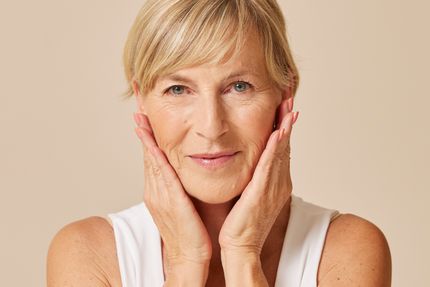Low energy and menopause
Fatigue and low energy are common symptoms that many women experience during midlife. Almost 50 percent of women in perimenopause report they are (extremely) tired in perimenopause, and this percentage rises to as high as 85 in postmenopause. This is quite understandable, given everything that is going on in your life and your body. How can you manage fatigue and get your energy levels up?

I have a ton of things to do but I can't even think straight, I am so tired. I've spent two days on the sofa doing nothing. This is not like me at all. - Sonja (age 56)

In addition to the physical and mental challenges of menopause, you may be juggling a demanding job and a hectic family life with teenage children alongside caring for your elderly parents and an active social life. The fact that you are more sensitive to stress during your menopausal years can make it very difficult to keep all these balls in the air.
Fortunately, you don't have to live with low energy levels. There are various ways in which you can support hormonal balance, thereby boosting your energy levels. And remember, once your hormone levels settle after menopause, your energy and motivation should return to normal.
What is happening in your body?
Oestrogen regulates energy expenditure at the cellular level. When that regulation is weakened due to a decline in oestrogen, this can result in fatigue. Fatigue is when you feel very tired, weak, drained and worn out.
But the decline in oestrogen is not the only culprit. Oestrogen also has other effects like increasing serotonin, the so-called happiness hormone. When your oestrogen levels drop, serotonin decreases too. Serotonin is needed to produce melatonin, the sleep hormone. Less serotonin means less melatonin. This explains why you have difficulty falling asleep, have less energy during the day and lie awake at night.
Serotonin also stabilises your mood and well-being, and regulates feelings such as happiness. Hence, low serotonin can cause you to feel unhappy, overly emotional (crying spells, rage) or agitated. Dealing with this roller coaster of emotions and mood swings can be draining for anyone, let alone someone already grappling with menopausal challenges.
In addition, other factors, whether or not related to menopause, may also contribute to fatigue. For example, night sweats, hot flashes, heavy periods and stress can impact your energy levels more than you realise.
Many women experience a host of symptoms as they go through menopause, such as hot flashes, sleep problems and mood swings.
What can you do?
Minor lifestyle changes can make a huge difference when it comes to fatigue and other menopausal symptoms. Take, for instance, your diet and relaxation habits. Small, simple changes can go a long way. Some tips:
- Find out what triggers you. Every woman is different. Everyone gets energy from different activities. What activities or situations drain your energy? How do you recharge your battery?
- Good sleep hygiene is very important. Make sure your bedroom is dark, go to bed and wake up around the same every day, and avoid screens.
- Avoid sugars and make sure your diet is rich in vegetables, fruit, nuts and seeds, and slow-acting carbohydrates (e.g., silverskin rice, whole-wheat pasta, legumes and quinoa).
- Reduce or quit nicotine, alcohol and caffeine.
- Make sure you get at least 30 minutes of exercise each day. Physical activity boost energy levels, improves sleep and increases happiness.
- Reduce stress by carving out time in your day to relax. Do breathing exercises, practise mindfulness, read a book, take a walk outside or just have a chat with someone you love.
- Support your body health with supplements that help with fatigue, such as Vitamin D, Vitamin B12 and magnesium. Be sure to get specialised advice so that you know which supplements you need.
Your path to a smooth menopause starts here
Get the tools you need to navigate menopause with more ease and to educate yourself about your body. With tips and insights from experts, and relatable stories of women just like you. Press play, not pause.
What treatment is right for you?
The best advice for getting your energy back is to take care of yourself by eating well and getting a good night's sleep. If you're still lacking energy, consider taking supplements for an extra boost.
Can hormone therapy help?
The best advice we can give you to get your energy back is to take good care of yourself. By this, we mean eating a healthy diet and getting enough sleep. Do you suffer from other severe symptoms besides fatigue? Then hormone replacement therapy (HRT) might be an option for you. HRT treats symptoms of menopause like hot flashes, vaginal dryness and mood swings by supplementing the body with hormones that are lost during menopause.

Hormone therapy has helped tremendously with my night sweats. Now that I sleep better, I have more energy during the day. – Lin (age 48)

Sources
- Taylor-Swanson L, Wong AE, Pincus D, Butner JE, Hahn-Holbrook J, Koithan M, Wann K, Woods NF. (2018). The dynamics of stress and fatigue across menopause: attractors, coupling, and resilience. PMID: 29189603.
- El Hajj A, Wardy N, Haidar S, Bourgi D, Haddad ME, et al. (2020). Menopausal symptoms, physical activity level and quality of life of women living in the Mediterranean region.
- Wender Carly L. A., Manninen Mika, O’Connor Patrick J. (2022). The Effect of Chronic Exercise on Energy and Fatigue States: A Systematic Review and Meta-Analysis of Randomized Trials. https://www.frontiersin.org/journals/psychology/articles/10.3389/fpsyg.2022.907637/full.
Tips and advice


FAQ
What supplements help reduce fatigue?
If your energy level is low, Vitamin D, Vitamin B12 and magnesium can help. If you're lacking these nutrients, you can take supplements to support your physical health. Go to supplements.












